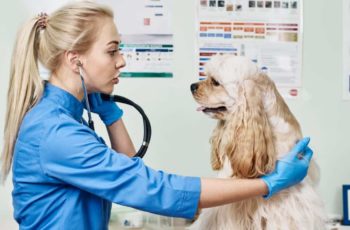Trash pandas, snack bandits, mischief makers—racoons have a reputation for causing mayhem, but that doesn’t mean they’re always dangerous or antagonistic. Knowing how to handle racoons is a valuable skill especially if you have a dog.
Dogs and raccoons aren’t always likely to attack one another, but fights can develop in certain circumstances, especially if there’s food involved. When you consider that raccoons are famous for eating everything, and we mean everything, food aggression is a realistic concern. Wild raccoons often carry viruses and diseases that can have dangerous (or even deadly) consequences for your furry friend after a physical altercation.
If you’re wondering what to do when Fido meets a fierce snack bandit, we have the answers. These tips about raccoon and dog encounters will help you to keep your furry friends safe from harm.
Learning Raccoon Behavior
What To Expect
Before we discuss strategies for dealing with a dog-meets-raccoon situation, let’s examine a racoon’s behavior and their common characteristics.
Routine
Raccoons are nocturnal mammals that are mainly active as the sun is setting and throughout the night. This means you aren’t likely to encounter one on your daily walk. If you do encounter one during the day, they probably won’t say hello. Raccoons sleep in quiet and dark places, so if you’re out and about during the day, don’t let your dog go digging and disturb their rest.
Temperament
Racoons are skittish by nature. However, if they feel threatened they can quickly become aggressive especially if they are caring for their offspring. It’s never a smart idea to corner a raccoon or let your pup chase them. A simple situation can quickly turn dangerous if a raccoon feels threatened, just like any wild animal.
Raccoons and Rabies
Unfortunately, raccoons belong to the rabies vector species, meaning that they are more prone to carrying or transmitting rabies than other animals. A simple altercation between a racoon and a dog could lead to detrimental consequences. This is one of the main reasons why preventative pet vaccinations are essential.
Racc Attack! What Do I Do When Fido Meets A Fierce One
Even if you live in the middle of a city, encountering a racoon is common. They aren’t particularly deterred by humans or other animals and are comfortable exploring nooks and crannies if they feel they may find food or shelter.
As cute as raccoons are, you should avoid encountering one if possible, as they are typically feral. Wild animals can quickly become aggressive if there are other threats around, during mating season or if they are caring for their young.
If a raccoon becomes aggressive, it will not let up easily. They are tough little animals that use their sharp claws and teeth to attack and defend themselves.
Steps to Avoid a Racoon Encounter
If you do find yourself face to face with a racoon or your dog encounters one, here are a few tips to handle the situation:
- Slowly back away: This might seem obvious, but the first tip is to try and back away quietly. Chances are they might not even notice you and you can walk by..
Steps to De-escalate a Racoon Encounter
If you start seeing signs of aggression from your dog or the raccoon, you’ll need to step in. Here’s what you can do:
- Shift the focus to food: Raccoons are food-driven, and if you have your dog on a leash, you may be able to get away by distracting the raccoon and tossing a few treats down. This is best accomplished if your dog is on a leash so Fido doesn’t try and get the treats.
- Use the shovel method: The shovel method involves using a shovel or other long tool (such as a broom or a rake) to push the raccoon away from you and your pet.Although raccoons can reach speeds of up to 15 miles per hour, they’re not that likely to chase you if you’re actively pushing them away.
- Spray the raccoon with cold water: Raccoons don’t like getting wet (unless they choose to), so spraying (or pouring) water on them can prompt them to run away.
- Get the raccoon away from your pet, not your pet away from the raccoon: Unfortunately, raccoons don’t give up easily. Focus on removing the threat rather than your removing your pet. This is because removing your pet still gives the raccoon free reign to continue attacking.
If a physical altercation of any kind develops, and you’ve made contact with the animal, take yourself and your doggie to a hospital ASAP. Even a small scratch from an infected raccoon s enough to spread deadly viruses like rabies.
Remember: raccoons aren’t likely to be aggressive, but when they do become aggressive, they’ll go all in.
Extra Tips When Encountering a Racoon
As a dog owner, it’s your responsibility to avoid danger and educate yourself on prevention and de-escalation. Fortunately, there are a number of ways that you can manage a raccoon encounter responsibly.
Responsible Dog Owner Tips:
- Always keep your dog on a leash
- Train your dog ahead of time
- Memorize and write down the number of a local wildlife monitor. If an aggressive raccoon (or even just an overly curious one) is around, locals should be made aware of it.
- Learn what to do incase of an emergency. Reading posts like this can teach you how to handle a raccoon incident and what to do if you find yourself in one. Educate yourself and share what you know with other pet parents to avoid worst-case scenarios.
Safety First, Always
Safety must be a top priority for pet parents. Afterall, our pets are members of our family and you wouldn’t want to harm your pet simply because you didn’t know how to take action.If you live in an area where raccoons are common, knowing what to do when you encounter one is crucial.
Also, ensure that your best friend’s vaccinations are always up-to-date and you are prepared to encounter this feisty little mammal. They may be small, but they should not be underestimated, and your pet’s health and safety need to be protected. Stay safe out there!
Written by Maggie Vasquez





